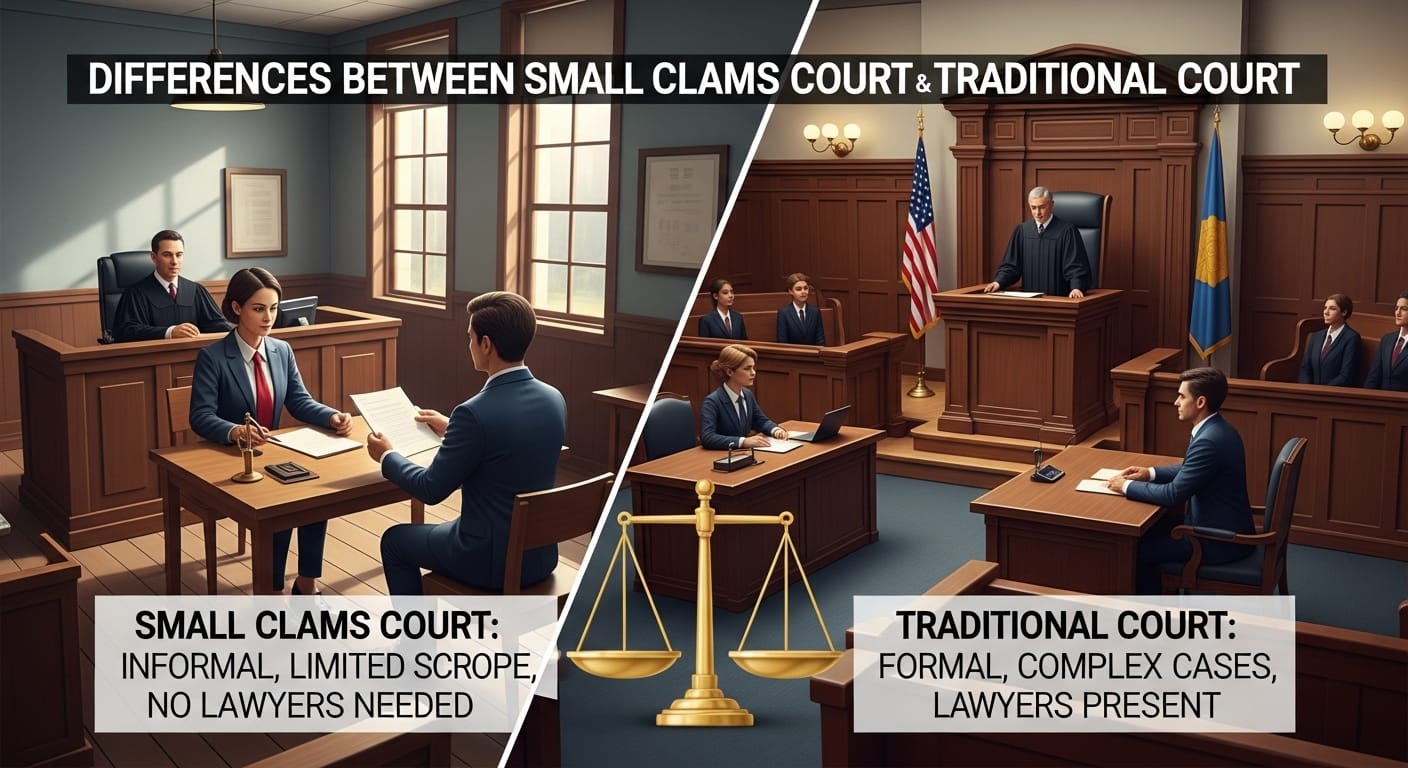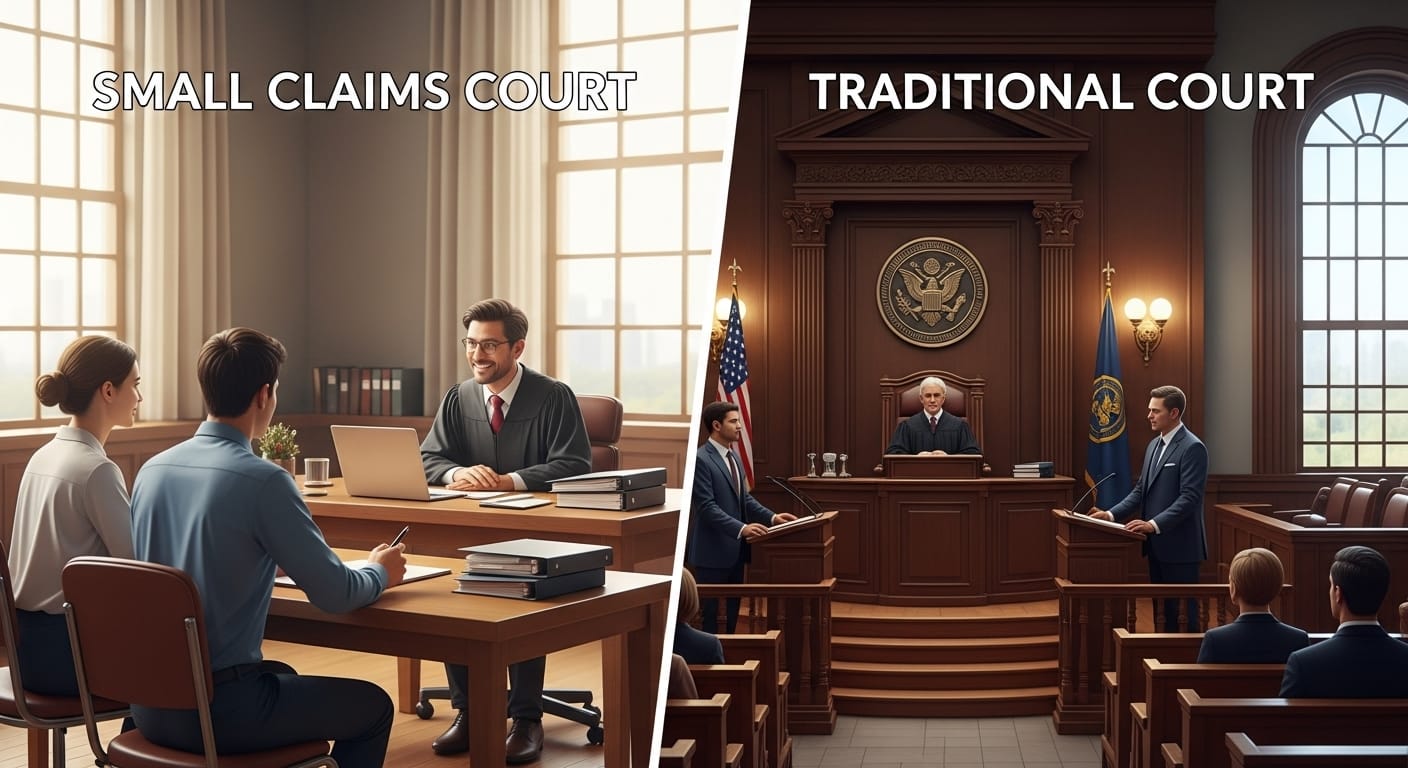If you’ve ever found yourself staring at a legal document or trying to figure out what exactly the terms “small claims court” and “traditional court” mean, you’re not alone. They can seem like the same thing, but trust me, they’re not.
Think of small claims court as the “fast food” version of the legal world, while traditional court is like dining at a fancy restaurant—there’s more complexity, more time, and (usually) more expensive. But how exactly do they differ, and which one is better for your case? Let’s dive into the details.

Top Takeaways and Key Concepts
Choose Based on Case Complexity: Use small claims for simple disputes under the jurisdictional limit.
Consider Legal Representation Needs: Small claims usually require self-representation; traditional court often needs lawyers.
Evaluate Cost Differences: Small claims are cheaper; traditional court can involve high attorney and court fees.
Assess Time Commitment: Small claims resolve quickly; traditional court cases may take months or years.
Understand Formality and Rules: Small claims are straightforward and casual; traditional court is formal and procedurally complex.
Summary of This Article
The article compares small claims court with traditional court, highlighting differences in cost, complexity, time, and legal representation. Small claims are best for minor disputes, quick resolutions, and lower costs, while traditional court handles complex cases with higher stakes and formal procedures. Key factors for choosing the right forum include case complexity, potential financial exposure, need for lawyers, and willingness to navigate legal formalities. Understanding these distinctions helps individuals select the most effective and efficient path for their legal matters.
Courtroom Drama: A Side-by-Side Comparison

First off, let’s set the stage: the courtroom drama. In a traditional court, you’ve got all the bells and whistles—lawyers in suits, witnesses testifying, long-winded arguments, maybe even a few objections thrown in for good measure. It’s the kind of drama you see on TV, with a judge, a jury (in some cases), and a whole bunch of legal procedures that could make anyone’s head spin.
On the other hand, small claims court is a lot like an impromptu meeting between you and the other party. It’s stripped-down, no-nonsense, and you’re usually representing yourself. There are fewer formalities, less waiting around, and no complicated legal jargon. The judge in small claims court isn’t there to hear long-winded speeches. Instead, they want the facts, and they want them quickly.
Who’s in Charge? Judges vs. Lawyers
When you think of traditional court, you probably picture lawyers—lawyers who’ve spent years in law school, honed their skills in many a courtroom battle, and are well-versed in every obscure legal term. In traditional court, lawyers make up a significant part of the process. They argue your case, file motions, and even prep you for court appearances.
Small claims court, however, doesn’t have the luxury of lawyers. In fact, most people who end up in small claims court are there because they don’t want to (or can’t afford to) pay for a lawyer. Instead, you handle the case yourself. Sure, the judge is still in charge of things, but there’s no formal representation, and it’s all about getting to the point—quickly and efficiently.
The Cost: Expensive vs. Cheap (You Guess Which Is Which)
Let’s be honest, the main reason many people head to small claims court is the cost—or rather, the lack thereof. Filing fees in small claims court are typically much lower than in traditional court. You’re not paying for high-priced attorneys, expert witnesses, or court reporters. And if you win, you usually don’t have to spend a small fortune on the legal process.
Compare that to traditional court, where you can easily rack up thousands of dollars in attorney fees, court costs, and other expenses. This is why many people in traditional court cases may settle before it even goes to trial—they just can’t afford to keep fighting. But don’t expect a small claims court case to be free either. There are still fees to be paid, but they’re far less expensive.
Time Is Money: Quick vs. Long
In the world of small claims, time is the essence. Cases are typically resolved much faster than in traditional court. You file your claim, you show up for your hearing, and the judge makes a decision—sometimes on the same day. No weeks or months of waiting around. It’s like fast food: in and out, and you get what you need quickly.
Now, contrast that with traditional court. A typical lawsuit in traditional court can take months or even years to resolve. You may go through pre-trial motions, discovery, depositions, and several hearings before you even get to the trial. And when you finally do go to court? Well, you’re probably looking at a long, drawn-out process that could leave you wondering if it’s even worth it.
The Rules: Simple vs. Complex
Small claims court is all about simplicity. The process is designed for people who don’t have a law degree but want to settle a dispute. The rules are straightforward. You present your evidence, make your case, and the judge makes a decision. It’s a level playing field for the most part, and while there are still some legal rules, they’re far easier to navigate than in traditional court.
Traditional court, however, is a labyrinth of legalese and complex procedures. From filing motions to preparing discovery requests, you need to know what you’re doing if you’re going to keep up. It’s like trying to assemble IKEA furniture without the manual—sure, you might get there, but it’s going to take longer than you’d like.
Who’s Present? No Juries Here
In small claims court, there’s usually no jury. It’s just you, the other party, and a judge. The judge makes the final decision, which means no waiting for a jury to deliberate. It’s efficient and gets to the heart of the matter.
In traditional court, however, you might find yourself dealing with a jury. A group of your peers gets to decide your fate. While juries can be unpredictable, they also bring a layer of complexity and formality to the proceedings. The judge is still the one calling the shots, but juries play a huge role in deciding the outcome.
The Type of Cases: Everyday Disputes vs. Everything Else
Small claims court is designed for everyday disputes—things like unpaid bills, rental deposit issues, and contract disagreements. The amount of money in question is typically smaller (depending on the jurisdiction, usually under $10,000), and it’s often something that doesn’t warrant the attention of traditional court.
On the other hand, traditional court handles everything else. Personal injury cases, complex business disputes, divorces, and criminal cases all go through traditional court. These are often more complicated, involve larger amounts of money, and require legal professionals to argue your case.
The Level of Formality: Casual vs. Formal
When you walk into a small claims court, it’s a pretty laid-back experience. Yes, you still have to follow the rules, but overall, it’s less formal than the big leagues. You might even see people in jeans and a T-shirt sitting in the waiting area. The judge will expect you to stick to the facts, but there’s usually less of the high drama you see in traditional courtrooms.
Traditional courtrooms, however, have a very formal atmosphere. Lawyers are in suits, and everyone addresses the judge with “Your Honor.” It’s like the legal version of a Broadway play—lots of preparation, lots of formality, and lots of time to get everything right.
Conclusion: Which One is Right for You?
So, when should you go to small claims court, and when should you head to the traditional court? If your case involves a relatively small amount of money, and you’re willing to handle things yourself without a lawyer, small claims court is your best bet. It’s quicker, cheaper, and much more accessible.
But if your case is more complex or involves a significant amount of money, you might need the full weight of traditional court to get the resolution you want. Just be ready for a long, expensive road ahead.
Resources
Small Claims Court: A Complete Guide
https://www.nolo.com/legal-encyclopedia/small-claims-court-overview
Differences Between Small Claims and Civil Court
https://www.legalzoom.com/articles/differences-between-small-claims-and-civil-court
How Small Claims Court Works
https://www.lawhelp.org/us/resource/how-small-claims-court-works
Frequently Asked Questions
What is the main difference between small claims court and traditional court?
Small claims court handles simpler, lower-value disputes quickly and affordably, while traditional court manages complex cases with formal procedures and higher costs.
Do I need a lawyer for small claims court?
No. Small claims court is designed for self-representation, allowing individuals to present their own cases without hiring attorneys.
What types of cases are suitable for small claims court?
Small claims court typically handles minor disputes such as unpaid debts, rental issues, or contract disagreements under a certain monetary limit, often around $10,000 or less.
How long does it take to resolve a small claims case compared to traditional court?
Small claims cases are usually resolved within weeks, while traditional court cases can take months or even years due to complex legal procedures.
Are small claims court hearings less formal than traditional court proceedings?
Yes. Small claims court is more casual and simplified, whereas traditional court requires strict adherence to legal protocols and formal courtroom conduct.
What are the cost differences between small claims and traditional court?
Small claims court has low filing fees and no attorney costs, while traditional court can involve expensive attorney fees, court costs, and longer proceedings.
When should I choose traditional court over small claims court?
Choose traditional court for high-value, complex, or legally intricate cases requiring professional legal representation and detailed procedural handling.

Kevin Collier is a legal expert passionate about simplifying complex legal concepts for everyday individuals. With a focus on providing clear, practical information, he covers a wide range of topics, including rights, responsibilities, and legal procedures. Kevin aims to empower readers with the knowledge they need to navigate the legal landscape confidently, ensuring they can make informed decisions regarding their legal matters. Through insightful articles and easy-to-understand resources, he helps demystify the law, making it accessible to all.










